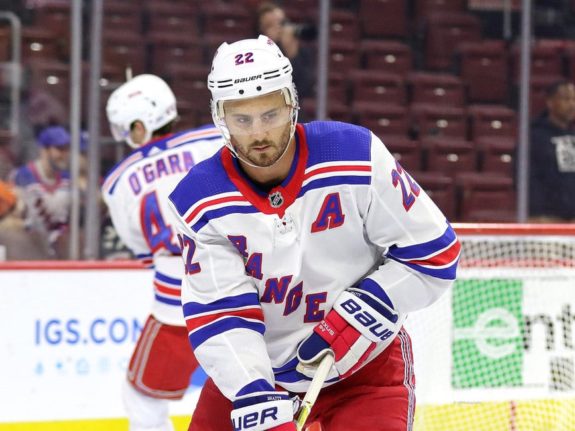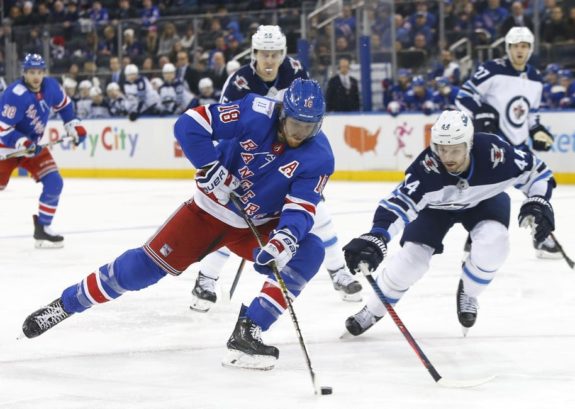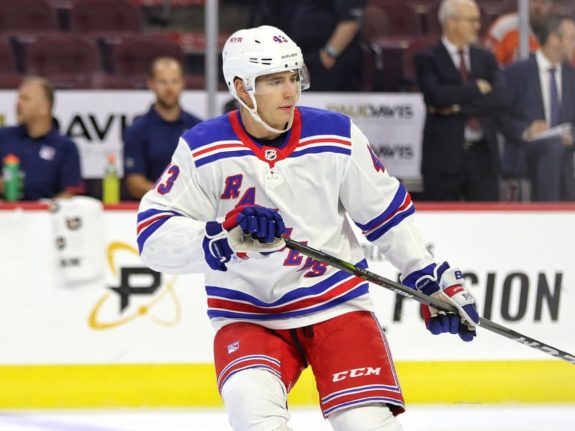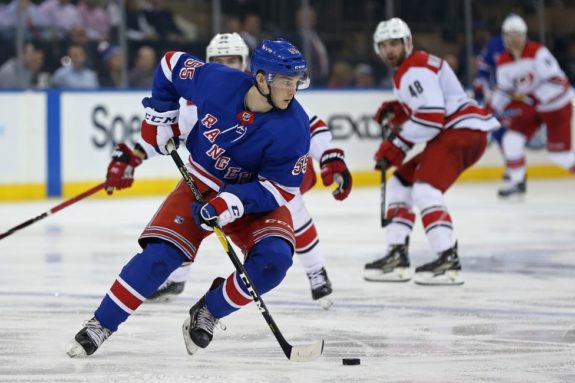![]()
So far, the New York Rangers have been passing the “patience test” during their rebuild.
No impulsive big-name free-agent signings or quick-fix trades. No rushing youngsters in the minors who aren’t ready for the NHL level. Just a steady, gradual approach to the process of properly laying a foundation for the future – one they hope will yield consistent playoff appearances and eventually, Stanley Cup contention.
The next hurdle on that path will come this offseason when the front office will once again have the opportunity to buy out expensive contracts, most notably on defense. While the idea does in some ways seem tempting, taking the buyout plunge would seem to violate the organization’s stated theme of restraint.
The prime targets for an early departure from the Rangers’ blue line are: Kevin Shattenkirk (two more years, $6.65 million annual cap hit), Marc Staal (two years, $5.7 million per) and Brendan Smith (two years, $4.35 million). While there’s a chance Shattenkirk could be traded, it seems all but impossible that Staal and Smith could be, especially not without similarly bad contracts coming back to Broadway in the process. Adding in the fact that many of the organization’s top prospects are defensemen, one would think cutting ties with at least one of those three players might be a key step in the rebuild.

Going down that road, however, might only set the process back. Buying out any of the three means most of their remaining salaries will be spread over four years instead of two, extending bad financial commitments into years in which the Rangers might be ready to add big free agents as key pieces to an again-competitive team.
It’s what the club is already dealing with in the bought-out deal of defenseman Dan Girardi (remember him?), who’s being paid $3.61 million this season, $3.61 million next season and $1.11 million for each of the three after that, the consequence of the June 2017 decision to rid themselves of the final three years of the former Blueshirt’s ill-advised six-year, $33 million extension.
Related: Rangers’ Power Play Surges, Defense Collapses
The issue of buying anyone out is more than a question of having a glut of dead money extending into the future, however. Though hardly as exciting as watching Filip Chytil’s offensive skills start to emerge or Neal Pionk grow into a potential mainstay on the blue line, Shattenkirk and Staal are at least serving in critical bridge roles to a better future for the Rangers.
Shattenkirk, Staal Are Keys to Rangers’ Transition
Though most of his season-plus tenure with his hometown team has been a disappointment, Shattenkirk’s health and game have finally started to come around, as he recorded a goal and three assists in his last six games before the All-Star break. Staal, meanwhile, was steady and dependable last season and has been even better in 2018-19, providing rock-solid play, stability and leadership among the defense corps.

Simply put, while the deals of Shattenkirk and Staal are certainly overpriced and regrettable, it’s not as if the Rangers aren’t getting any sort of a return on them. And the importance of that return now, and in the near future, might be overlooked.
Because while one of the aforementioned defensive prospects, Ryan Lindgren, has performed well in his first three NHL games after being called up mid-month, some of the others don’t appear ready. Libor Hajek, the highly-touted player who was the key acquisition from the Tampa Bay Lightning in last February’s Ryan McDonagh trade, has had a less-than-impressive season with the AHL’s Hartford Wolf Pack with no goals, five assists and a minus-18 rating in 45 games.
Yegor Rykov, another young defenseman acquired during last season’s selloff in the Michael Grabner trade with the New Jersey Devils, is playing in the KHL, while the once-highly regarded Sean Day has posted a minus-nine mark in 17 games at Hartford this season. Meanwhile, K’Andre Miller and Nils Lundkvist, first-round draft picks in June, are likely years away from Broadway.

All of those players need time to grow, and the Rangers don’t want to rush them. Thus, the timing of the expiration of Shattenkirk’s and Staal’s deals could end up being more or less be perfect. The veterans give the Blueshirts stability in their own end and the ability to gradually work in the kids who prove ready, as they’re doing with Lindgren now.
Buying out Shatty and Staal would likely require the club to then go and find other veterans to serve in their current roles, unless the plan is to throw Hajek, Rykov and Co. into the fire next season and let them sink or swim – an approach that runs counter to coach David Quinn’s philosophy of expecting young players to earn ice time and not be handed it. The price of cutting bait, of course, would be doubling the length of at least one more bad financial commitment to go with Girardi’s.
Smith presents a different case than Shattenkirk and Staal. Unlike those players, the Rangers have gotten little to nothing out of the former Detroit Red Wing since inking him to his four-year contract extension before 2017-18. That disastrous season ended with him in the minors, and he’s turned in another ineffective effort this season after getting off to a strong start. With no significant future as a Ranger, his contract is perhaps the most tempting to shed via buyout.
Rebuild Best Served by Letting Big Contracts Expire
Yet it would still be a mistake. The Rangers are better served minimizing the error and limiting the rest of it to two years rather than four. Sending Smith to Hartford for those remaining two seasons, which would give them $1,075 million in cap relief per season for his buried contract, would seem the least painful and smartest option.
The Rangers – and the fan base – need to maintain some perspective on the three bad deals. With just the two years after this season remaining on each, and a very good salary cap situation, it’s not as if the contracts are crippling the franchise. A buyout of any of them will also mitigate the windfall of cap space that’s set to grace the franchise in the summer of 2021, when by virtue of those three contracts, as well as Henrik Lundqvist’s deal ($8.5 million annual cap hit) expiring, the Rangers will have more than $25 million coming off the books.
By then, the Blueshirts might be ready to spend big in an attempt to take the next step back toward serious contention. In the meantime, Shattenkirk provides a desperately needed right-handed presence on the blue line, with Pionk and Tony DeAngelo still developing and Adam McQuaid expected to depart before the trade deadline. Staal can continue to help anchor the defense while leading and teaching Pionk, DeAngelo, Lindgren and others.

If Lindgren quickly becomes a keeper, and Hajek or Rykov force their way into the lineup sooner rather than later, then the club will indeed begin to face a conundrum of ice time on defense. That seems unlikely, however. Young players generally don’t make the NHL and begin an uninterrupted ascent. There are hiccups and setbacks along the road to learning what it takes to succeed on a nightly basis in the NHL.
Viewed that way, Shattenkirk and Staal are much-needed assets who can provide cover while Lindgren, Hajek, Rykov, etc. eventually find their way into full-time NHL employment – in theory, anyway. To buy out veterans on the assumption that the next wave won’t struggle or flop over the next two seasons seems extremely risky.
Related: New York Rangers Trio Led Charge in First Half
Acing the patience exam during this Rangers rebuild means sticking with and believing in youngsters through their ups and downs – and staying the course with some veteran defensemen, despite them being overpaid and from a bygone era in team history. Here’s betting that the Blueshirts will ultimately be better for it.